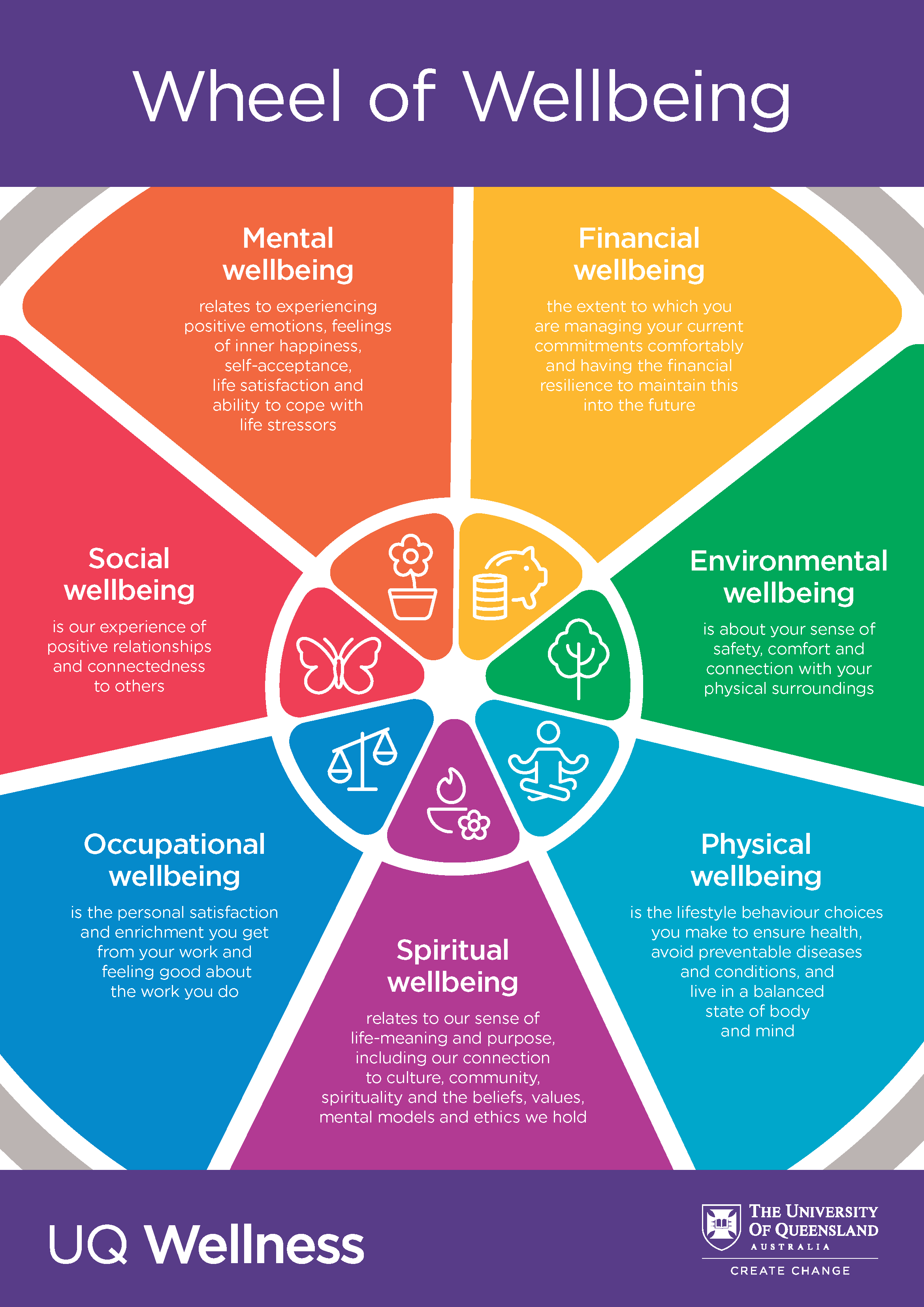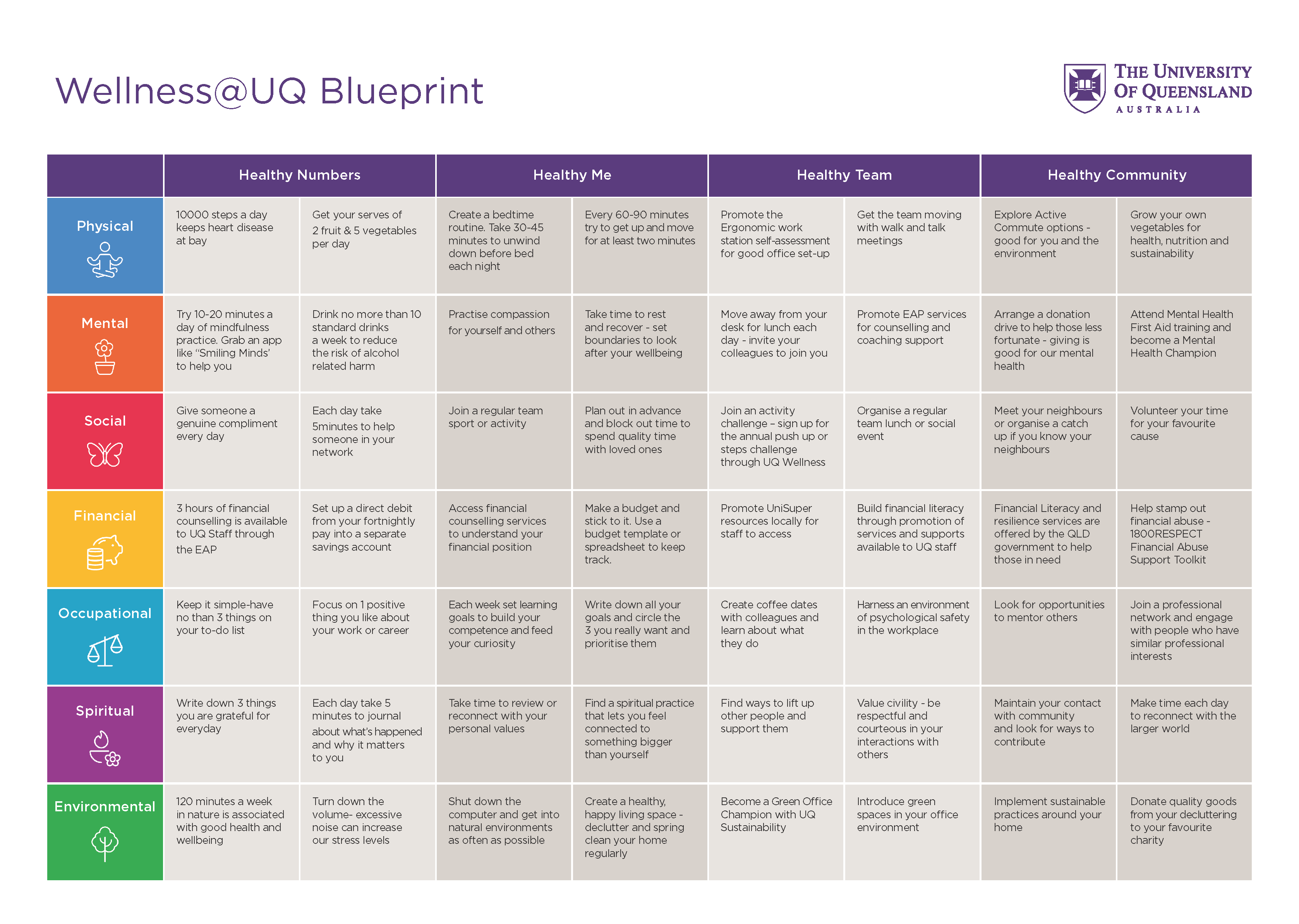Wellbeing and sustainability
![]() The vitality and personal wellbeing of people underpins prosperity, sustainable growth and development.
The vitality and personal wellbeing of people underpins prosperity, sustainable growth and development.
At UQ, we believe our achievements reflect the strength of our students, staff and alumni, nurtured by our commitment to enhancing our campus community and providing quality programs across the health professions.
UQ supports healthy living and wellbeing through a range of wellness initiatives, healthcare programs, sports facilities and campus safety programs.
Good health and wellbeing are deemed essential components of a holistic approach to sustainability, and wellbeing is one of the focus topics in the UQ Sustainability Strategy.
It is also recognised by the United Nations via a global sustainable development goal (SDG) to “ensure healthy lives and promote wellbeing for all at all ages”.
What is wellbeing?
 Wellbeing is a broad term that is used in diverse contexts. UQ has adopted a wellbeing framework, based on the wheel of wellbeing, which supports the idea that there are many different influences on people’s sense of wellbeing.
Wellbeing is a broad term that is used in diverse contexts. UQ has adopted a wellbeing framework, based on the wheel of wellbeing, which supports the idea that there are many different influences on people’s sense of wellbeing.
The wheel has seven spokes, each needing to function to enable the wheel to turn: physical, spiritual, occupational, social, mental, financial and environmental.
The UQ Sustainability Strategy recognises the importance of all these different influences in achieving the University’s commitment to nurturing a sustainable work life balance, a sustainable University and a sustainable world.
UQ’s sustainability performance reporting, using the international Sustainability Tracking, Assessment and Rating System (STARS), also includes a number of categories that align closely with the wheel of wellbeing.
UQ has been recognised internationally for the high quality of its wellbeing programs by the Sustainable Campus Index, which is compiled annually by the United States Association for the Advancement of Sustainability in Higher Education (AASHE). In 2022, UQ was rated in the top 10 universities globally for the index’s ‘Wellbeing and work’ category for the second year running.
Why is wellbeing important to sustainability?
The United Nations SDGs recognise that healthcare, education, gender equality and a range of other social goals must work hand-in-hand with climate action to achieve environmental, community and economic advancement over the long-term.
The AASHE Sustainable Campus Index also draws an explicit link between the physical and mental health of an institution’s staff and students, and its overall “character and capacity to perform”.
A growing body of global research further links the two concepts of ‘sustainability’ and ‘wellbeing’. In 2020, the World Happiness Report published an extensive body of empirical evidence analysing the connections between sustainable development and human wellbeing. Among other measures, it assessed countries’ rankings in the Sustainable Development Goals index against their own subjective wellbeing scores and found a “highly significant correlation”. In other words, the wellbeing of a nation’s people is vitally integrated with its long-term sustainable development.
Wellbeing support at UQ
 UQ has developed a wellness blueprint to help people start conversations and think about their own wellbeing. The blueprint offers ideas across all seven segments of the UQ wellbeing wheel and looks at wellbeing in the context of the individual, the work team and in the community.
UQ has developed a wellness blueprint to help people start conversations and think about their own wellbeing. The blueprint offers ideas across all seven segments of the UQ wellbeing wheel and looks at wellbeing in the context of the individual, the work team and in the community.
UQ students and staff can also find information about wellbeing initiatives in several areas across our websites.
Students may like to begin by exploring the UQ Life and my.UQ sites, which provide information about a range of fun and supportive programs and initiatives in many key wellbeing areas, including physical health, mental health, social clubs, religion and much more.
Students can also become involved in sustainability work through the student-led Green Ambassador Program, which brings to life many of the important influences associated with increasing and maintaining wellbeing. These include social events, environmental initiatives and even physical activity, with plenty of opportunities for bush care, waste collection and other practical volunteering activities.
Staff are supported by the Health, Safety and Wellness division, which is dedicated to both improvement in and management of occupational health and safety on campus, as well as proactively driving a positive health, safety and wellness culture at UQ. Like students, staff can access a number of wellbeing programs offered to them across key areas.
Everyone is also encouraged to play their part in looking after the safety of themselves and others on campus. Students and staff can find information about keeping safe on campus here.
More about wellbeing and sustainability
